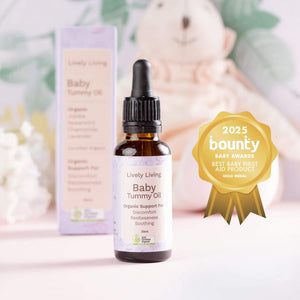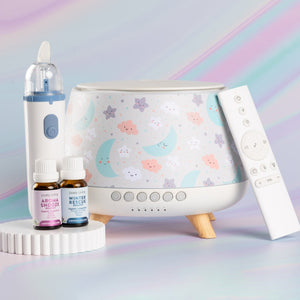Supporting Your Child's Immune System Naturally
As parents, we often look for ways to help our kids stay healthy. Supporting your child's immune system naturally is an excellent approach to assist them in staying strong and fending off illnesses. With a wealth of information available, figuring out where to begin can sometimes feel overwhelming.
Don't worry; this guide is here to help. It will walk you through straightforward, natural methods to boost your child's immunity. From dietary adjustments to lifestyle changes, you will discover practical tips that you can implement starting today.
Ready to support your little one in staying healthy and robust? Let's explore effective strategies for natural immune support for kids and ensure their immune systems are working properly.
Table of Contents:
- Understanding Your Child's Immune System
- Why Focus on Natural Immune Support?
- Nutrition: The Foundation of Immune Health
- The Power of Sleep for Immunity
- Exercise: Moving for Health
- Stress Management for Kids
- Herbal Helpers for Immunity (with caution)
- The Role of Hygiene
- A Note on Vaccinations
- Vitamin D: The Sunshine Vitamin
- Hydration for Health
- The Power of Positive Thinking and Outdoor Time
- Conclusion
Understanding Your Child's Immune System
Before focusing on support strategies, it's helpful to understand a bit about your child's immune system. This complex network of cells, tissues, and organs works together to defend the body against harmful invaders like bacteria, viruses, and other pathogens. A primary function of the immune system is to differentiate between the body's own cells and foreign substances, launching an immune response when necessary.
Key players in this system include white blood cells, which are crucial immune cells. These blood cells, such as lymphocytes and phagocytes, identify and destroy germs. A robust immune system can mount an effective immune response, reducing the frequency and severity of illnesses your kids encounter, especially during flu season or the school year.
Supporting this system naturally involves providing the body with the right building blocks and conditions for optimal performance. This approach helps children develop resilience against common infections and contributes to their overall well-being, ensuring their immune systems functioning efficiently. Helping your child maintain a healthy lifestyle is a fundamental way to support immune functions.

Why Focus on Natural Immune Support?
Choosing to focus on natural immune support offers many health benefits for children. Our bodies possess remarkable inherent defense mechanisms. When we support these immune systems naturally, we empower our bodies to perform their protective functions optimally.
For children, a strong immune system is particularly vital. They are frequently exposed to a wide array of germs in environments like school, daycare, and playgrounds. A robust immune system helps them remain healthy, active, and better able to fight infection if a health problem arises.
Natural methods are often gentler on young, developing bodies. They collaborate with the body's intrinsic processes rather than attempting to override them. This synergy can lead to improved long-term health and a reduced likelihood of developing a weak immune system.
Nutrition: The Foundation of Immune Health
What your child eats profoundly influences their immune function and overall gut health. A balanced diet, rich in whole foods, supplies the essential nutrients their immune system requires to operate effectively. Prioritizing healthy eating habits from a young age sets the stage for lifelong wellness.
Incorporating a variety of fruits, vegetables, lean protein, and healthy fats ensures a broad spectrum of vitamins and minerals. These nutrients are vital for the production and function of immune cells, including white blood cells. Good nutrition is a cornerstone for keeping your child healthy.
Special consideration should be given to a baby's immune system development. For infants, breast milk is an unparalleled source of nutrition and antibodies, providing passive immunity and helping to establish a healthy gut microbiome from the start. If breastfeeding is not an option, quality formulas also aim to support a baby's immune development.
Key Nutrients for Immune Support
Certain nutrients are particularly important for a strong immune response. Ensuring your child gets enough of these can make a significant difference. Many parents search search for the best ways to include these in their child's diet.
| Nutrient | Sources | Immune Benefits |
|---|---|---|
| Vitamin C | Citrus fruits (oranges, lemons), berries, kiwi, bell peppers, broccoli | Supports white blood cell production and function; antioxidant. |
| Vitamin D | Sunlight exposure, fatty fish (salmon, mackerel), fortified milk, egg yolks | Helps regulate immune cell activity and immune response. |
| Zinc | Lean protein (beef, poultry, seafood), nuts, seeds, legumes, dairy | Essential for immune cell development and communication; wound healing. |
| Vitamin A | Carrots, sweet potatoes, spinach, liver, dairy products | Maintains the integrity of mucosal barriers (e.g., in the gut and respiratory tract). |
| Vitamin E | Nuts, seeds, spinach, broccoli, vegetable oils | Powerful antioxidant, protects cell membranes from damage. |
| Iron | Red meat, poultry, fish, beans, lentils, spinach | Crucial for the proliferation and maturation of immune cells. |
| Selenium | Brazil nuts, tuna, sardines, beef, poultry, whole grains | Antioxidant, supports immune response. |
| Probiotics & Prebiotics | Probiotics: Yogurt, kefir, sauerkraut, kimchi, other fermented foods. Prebiotics: Onions, garlic, bananas, asparagus, whole grains. | Support gut health and a balanced gut microbiome, which is central to immunity. |
| Omega-3 Fatty Acids | Fatty fish (salmon, mackerel, sardines), flaxseeds, chia seeds, walnuts | Help regulate inflammation and support immune cell function. These are crucial fatty acids. |
Strive to incorporate a wide array of colorful fruits and vegetables into your child's daily meals. Each color typically signifies the presence of different beneficial phytonutrients and antioxidants, contributing to a robust immune system. Offering healthy recipes can make this easier, even if you have a picky eater.
Managing a picky eater requires patience and creativity. Try offering small portions of new foods alongside familiar favorites, involve your child in food preparation, and make mealtime a positive experience. Remember, repeated exposure is often necessary for a child to accept a new food.
The Importance of Gut Health
A significant portion of the immune system resides in the gut, making child's gut health paramount. The gut microbiome, a complex community of trillions of gut bacteria, plays a vital role in training and regulating the immune system. A healthy gut microbiome helps protect against pathogens and supports a balanced immune response.
To nurture your child's gut health, include probiotic-rich fermented foods like yogurt, kefir, and sauerkraut (if palatable to them). Prebiotic foods, such as bananas, onions, garlic, and whole grains, feed beneficial gut bacteria. Minimizing processed foods also helps maintain a healthy gut environment, contributing to how your kids stay healthy.
Foods to Limit
Just as crucial as what your child eats is what they limit or avoid. Certain foods, when consumed frequently, can negatively impact the immune system and contribute to a weak immune state. These generally include:
- Sugary snacks and drinks: Excessive sugar can suppress immune cell function and promote inflammation.
- Highly processed foods: Often high in unhealthy fats, sugar, sodium, and artificial additives, and low in essential nutrients. These can disrupt gut health.
- Foods with artificial additives: Some artificial colors, flavors, and preservatives may negatively affect some children.
- Excessive saturated fats: While some fat is necessary, high intake of saturated fats found in fried foods and fatty processed meats can promote inflammation.
Reducing the intake of these items can substantially improve your child's immune health. Focus on replacing them with whole food alternatives to encourage healthy eating. A balanced diet is a cornerstone of a strong immune system.
The Power of Sleep for Immunity
Quality healthy sleep is absolutely essential for a strong immune system. During sleep, the body undertakes critical repair and regeneration processes. This includes the production and release of cytokines, proteins that help fight inflammation and infection, and the activity of immune cells.
Children require significantly more sleep than adults for their growth and development, including the maturation of their immune systems. Sleep supports the immune system's ability to remember and react to pathogens. If you want your child plenty of protection, encourage healthy sleep.
Here is a general guideline for recommended hours of sleep by age:
| Age | Recommended Hours of Sleep (including naps for younger children) |
|---|---|
| Infants 4-12 months | 12-16 hours per 24 hours |
| Toddlers 1-2 years | 11-14 hours per 24 hours |
| Preschoolers 3-5 years | 10-13 hours per 24 hours |
| School-aged children 6-12 years | 9-12 hours per 24 hours |
| Teenagers 13-18 years | 8-10 hours per 24 hours |
To help your child achieve restful and sufficient sleep child development experts suggest several strategies. Establish and maintain a consistent bedtime routine; this signals to your child's body that it's time to wind down. This regular schedule helps regulate their internal clock.
Limit screen time, especially from televisions, tablets, and phones, for at least an hour before bed as the blue light can interfere with melatonin production. Make the bedroom conducive to sleep: cool, dark, and quiet. These efforts encourage healthy sleep patterns that greatly support immune function.

Exercise: Moving for Health
Regular physical activity is another fundamental component of supporting your child's immune system naturally. Exercise helps immune cells, like white blood cells, circulate more rapidly through the body, allowing them to detect and combat infections more efficiently. It also helps reduce stress, which can positively impact immunity.
Aim for at least 60 minutes of moderate to vigorous active play or exercise for your child each day. This doesn't have to be structured sport; it can include a variety of fun activities. Consistent regular physical activity provides numerous health benefits.
Consider activities such as:
- Playing tag or other running games at the park.
- Riding bikes, scooters, or skateboards.
- Dancing enthusiastically to their favorite music.
- Engaging in active video games that require movement.
- Participating in team sports or playing sport with friends.
- Swimming or water play.
The crucial element is to make physical activity enjoyable. When children find joy in being active, they are more likely to develop a lifelong habit of regular physical movement. Exercise helps maintain a healthy weight, strengthens bones and muscles, and boosts mood, all of which contribute to a robust immune system ready to fight infection.
Stress Management for Kids
It might be surprising, but children experience stress too, from academic pressures to social challenges or changes at home. Chronic or ongoing stress can weaken the immune system by increasing cortisol levels, which can suppress immune response over time. Helping children learn healthy ways to manage stress is vital for their immune health and overall well-being.
Introduce simple stress-busting activities that your child can turn to when feeling overwhelmed. Deep breathing exercises, for example, can be taught even to young children as a quick way to calm down. Yoga designed for kids can improve flexibility, mindfulness, and helps regulate their nervous system.
Other effective techniques to reduce stress include:
- Creative expression through coloring, drawing, or painting.
- Spending quality time in nature, whether it's a walk in the park or playing in the backyard.
- Listening to calming music or engaging stories.
- Ensuring they have unstructured playtime to simply be kids.
- Encouraging open communication about their feelings and worries.
- Diffusing Child Calming and Immune Support Essential oils for kids
These activities not only help calm the mind and support immune function but also offer wonderful opportunities for bonding with your child. Teaching them how to reduce stress equips them with valuable life skills. Consistent stress management helps keep all bodily systems functioning optimally.

Herbal Helpers for Immunity (with caution)
Certain herbs have traditionally been used to provide gentle support to the immune system. However, it is very important to consult with your pediatrician or a qualified healthcare provider for medical advice before giving your child any herbal supplements. Children's bodies can be more sensitive, and what is safe for adults may not be for them, especially if there is an underlying health problem.
If your healthcare provider approves, some options often available in kid-friendly forms like syrups or gummies include:
- Echinacea: Sometimes used to shorten the duration of colds.
- Elderberry: Rich in antioxidants and may help fight flu viruses.
- Astragalus: Used in traditional Chinese medicine to strengthen immunity.
- Chamomile: Known for its calming properties, which can support sleep and reduce stress.
Remember, herbs are meant to be a supplementary support, not a substitute for a healthy diet, adequate sleep, and an overall healthy lifestyle. They are part_of a broader strategy to support immune health. Approach herbal remedies with caution and professional guidance.
The Role of Hygiene
Practicing good hygiene is a fundamental way to prevent the spread of germs and protect against infectious diseases. Teaching your children effective hygiene habits from an early age helps keep them and others healthy, especially during the school year and flu season. Simple practices can significantly reduce the number of germs kids encounter.
Key hygiene practices to emphasize include teaching the proper handwashing technique. They should wash hands frequently with soap and water for at least 20 seconds, especially before eating, after using the restroom, and after playing outside. Using a hand sanitizer with at least 60% alcohol is a good idea when soap and water aren't available.
Other important habits for good hand hygiene and overall cleanliness are:
- Covering coughs and sneezes with a tissue or the elbow, not their hands.
- Avoiding touching their face, particularly eyes, nose, and mouth, with unwashed hands.
- Not sharing personal items like water bottles, cups, or utensils.
- Keeping home surfaces clean, especially in high-touch areas.
Making hygiene fun, perhaps by using songs to time handwashing or rewarding consistent habits, can encourage children to adopt these practices. Consistent hand hygiene is one of the most effective healthy ways to prevent illness.
Vitamin D: The Sunshine Vitamin
Vitamin D, often called the 'sunshine vitamin,' plays a critical role in immune function and the body's immune response. It helps activate T-cells, a type of white blood cell, which are essential for fighting off infections. Adequate levels of Vitamin D are important for maintaining a strong defense system.
The primary and most natural source of Vitamin D is direct sunlight on the skin. Aim for about 10-30 minutes of midday sun exposure on your child's arms and legs a few times a week, depending on skin tone and location. Be mindful of sun safety; avoid overexposure that could lead to sunburn.
During colder months, in regions with limited sunlight, or for children with darker skin, obtaining sufficient Vitamin D from sunlight alone can be challenging. In such cases, dietary sources like fatty fish, egg yolks, and fortified foods (milk, yogurt, cereals) become more important. Your doctor might also recommend a Vitamin D supplement; it is a good idea to discuss this to determine the appropriate dosage for your child.
Hydration for Health
Maintaining proper hydration is essential for overall health and for keeping the immune system working properly. Water is crucial for numerous bodily functions, including the transport of nutrients to cells and the removal of waste products. It also helps keep mucosal membranes moist, which can enhance their ability to trap and fight pathogens.
Encourage your child to drink plenty of water throughout the day. The amount needed varies by age, activity level, and climate, but consistent sips are key. Dehydration can impair physical and mental performance and potentially weaken the immune response.
If your child isn't enthusiastic about plain water, try these healthy ways to boost their fluid intake:
- Infuse water with slices of fruit like berries, lemon, or cucumber for a hint of flavor.
- Offer herbal teas, such as chamomile or peppermint (cooled and unsweetened), which can also be soothing.
- Make homemade popsicles using diluted fruit juice or pureed fruit.
- Include water-rich foods in their diet, such as watermelon, cucumbers, oranges, and soups.

Ensuring your child stays well-hydrated supports all their body's systems functioning effectively, including their defense against infectious diseases. Make water readily available and model good hydration habits yourself to encourage healthy choices.
The Power of Positive Thinking and Outdoor Time
Believe it or not, a positive outlook and reduced stress can have tangible effects on physical health, including bolstering the immune system. Helping your child cultivate optimism and manage their emotions can contribute to a more robust immune response. Chronic stress and negativity can suppress immune function, so fostering positivity is beneficial.
Encourage these practices to promote a positive mindset:
- Practice gratitude together, perhaps by sharing something you're thankful for each day.
- Encourage open communication, allowing them to express their feelings without judgment.
- Celebrate small achievements and efforts, not just big victories.
- Teach resilience by helping them see challenges as opportunities for growth.
Spending time outdoors offers more than just Vitamin D; it's a natural mood booster and stress reliever. Fresh air and exposure to nature can improve mental well-being and encourage physical activity. Whether it's playing in a park, exploring a trail, or simply relaxing in a green space, regular outdoor time supports your child's immune system by promoting overall health and reducing stress, helping kids stay resilient.
Conclusion
Supporting your child's immune system naturally revolves around establishing and maintaining consistent healthy habits. From providing a balanced diet rich in nutrients and nurturing their gut health, to ensuring they get adequate healthy sleep and regular physical activity, these strategies collectively fortify your child's natural defenses. Managing stress and practicing good hygiene are also vital components to help your child stay healthy.
Remember, consistency is crucial when aiming to support immune health effectively. Small, sustainable changes implemented regularly can lead to significant improvements in your child's well-being and the strength of their immune response. Start by incorporating one or two of these suggestions and gradually build upon them as they become part of your family's routine.
By focusing on natural immune support, you are equipping your child with valuable tools for lifelong health and vitality. This commitment is an investment that often results in fewer sick days, more energy for learning and play, and a greater capacity to thrive throughout all the adventures childhood brings. It's about fostering an environment where your childâs immune system can perform at its best.



















